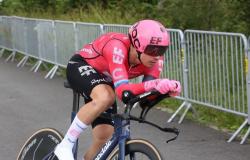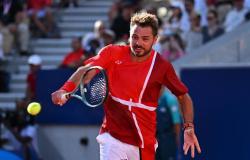What is your assessment of this first year of Marmara SpikeLigue and association with the Tui group?
It’s a real success. A real success first of all because of the quality of the partnership, if I listen to the Marmara teams. We have a happy and pleasantly surprised partner, which means that the deal went beyond what he expected. As much as he was convinced of the potential of the professional volleyball product, he hadn’t imagined the evocative power of the show, its dramaturgy as well as the quality and fluidity of the relationship surprised him, beyond his expectations. We have the same feeling. We share many common values. The rise in level of the MSL, in structural and economic terms, makes our venues more attractive, better organized, more dynamic. As a result, the spectator finds himself more and more there. If I look at the figures, we have progressed by another 20% this year in number of spectators and we have multiplied this number by two in less than three years! When I speak today of a Golden League, we are a Golden League. All these players, Olympic champions, come from our professional clubs, who put them on the court, who trained them, who made them grow and brought them to this level. If we do this assessment, at time T, I find that our League is in good shape.
There have been some tricky cases, however. One example is the financial relegation of NRMV, which had been a leading club in the elite for two seasons?
Yes, there are sometimes economic hiatuses. Clubs, by their very nature, are independent. The League notes this and regrets certain excesses. There are companies which, sometimes, economically speaking, encounter problems. This is the case of Nantes. This is unfortunately not a surprise. It was a club under surveillance by the DNACG. Proof that the DNACG is doing its job and had identified the problems.
But in your Club License project, that’s a serious dent, isn’t it?
This only reinforces the demand I have for equity from these clubs. Our clubs have a well-known weakness in the world of professional sport. Many have the rigorous side of the business leader, but high-level sport is also a touch of madness. Sometimes, the sporting desire to be among the best and to shine can lead to deviating from good management criteria. But I am not going to criticize this touch of madness which also makes our championship virtuous, which makes it improve. But I would like to remind you that all this, in good management, is done with equity.
In this quest for equity, are the clubs making progress?
It’s progressing. We’ve been extremely gentle in the process. It’s not about putting clubs in difficulty either, by having requirements that don’t correspond to reality. In our Club License, clubs will have to have reached, in four years, 10% of equity in their budget. That’s very reasonable. Which means that we have to increase our equity, overall, by 2.5% per year. Going further would be putting them in difficulty when the goal is to strengthen them. That’s also what’s interesting. Who would have put a “bitcoin” on the Saint-Nazaire coronation, who would have put a “bitcoin” on Paris-Levallois in LAF? Average budgets are up by around 15% for men and 30% for women! This Club License and the project we are developing are bearing fruit. Economically speaking, our League is progressing, a lot. We had established sporting balance points for several years, they have been largely breached this season. Which proves that there is a real sporting dynamic. And this will allow new clubs to structure themselves further. Saint-Nazaire will make a quantum leap by playing in the Champions League.
We have seen the difficulties of Ligue 1 football in “selling itself” on television, what will the visibility of professional volleyball be on screens in concrete terms when the season starts again?
The LNV is not trying to stand out, it is trying to ensure that professional volleyball gets maximum exposure. We were the first to develop a streaming TV. This streaming TV had 7,200 subscribers last year, which is far from insignificant. At the start of the mandate, there were not even any paying subscribers and the broadcasts were done with smartphones. We are in a position where we have our own tool, which allows us, against all odds, to always exist and always produce an image. Behind this, we are still present on beIN, with a little question mark given the discussions between Ligue 2 football and beIN, and we will always be present on Sport en France for our Women’s League. I would say that we have maximum visibility today. It would be better to be present on a free channel on Saturday evenings, but we are not there yet (smile).
It was a bit of a madness for two weeks at Porte de Versailles this summer. How can the LNV ride on the wave of the French men’s team’s second consecutive Olympic title?
I think there are three levels on which we can bounce back. First, at the partner level. In clubs, the Olympic title means that partners ring the doorbell saying: “I want to be in it!” The image that our French team gives and the fact that our sport corresponds today to societal desire are real accelerators. I’m not targeting anyone, but this rugby that talks all the time about its values, when we go through the litany of everything we’ve seen this year, that’s enough. We don’t talk all the time about our values, we’re not a sport of protest, we’re not “proud”, but the fact remains that these partners have clearly identified these values which, societal today, correspond to what people expect. There is sympathy, empathy, kindness, a place where we are comfortable, where we share, where we come as a family without getting the finger, without hearing “NTM” in the stands etc. Economic partners are like us, they come looking for these simple values, of conviviality. The second level takes place at the League level. When I arrived three and a half years ago, when we called a potential partner, he wasn’t there, he had aqua pony, he had lots of reasons not to take us on the phone. Today, we are listened to. We don’t necessarily say yes, but we are listened to, once, twice, we discuss. The files concerning the LNV are weighed up. We are welcomed now and listened to. We are not always heard but we are listened to. Then, the third point of valorization is through ticketing. It’s up to us to put this to music. People will come to the venues to seek this sharing, this humanity, this sense of celebration that there was during the Olympic Games. Volleyball is the sport of double Olympic champions! It’s up to us to ensure that in our championships, we find this notion of celebration, of shared spectacle. We have three entry points to valorize. They are there. It’s up to us to be vigilant and have the humility necessary to use them to the best of our ability.
Finally, there are, to date, thirteen clubs involved in the MSL. Will we start like this or will there be a fourteenth club invited?
We talked about Club License, equity, the desire for structuring. The shortest path is the easy way, but that is certainly not what makes progress. Today, is it in the interest of the MSL, to make a round figure that pleases I don’t know who, to integrate a fourteenth team? What does that change? Today, I want to be at 14, I want to be at 20, from the moment I have clubs that are structured, sustainable, economically viable and capable of financing an MSL season corresponding to the quality of show that we want to give. Promoting a club from League B, with a League B budget, which will have difficulty making ends meet, is not what we are trying to build. The average budget in MSL is 1.6 million, the median budget is 1.7. Today, we are consistent with what we defend around the Club License. We understand the disappointment of some but we are building a Pro league not a federal sport with a Pro section. It would be a colossal strategic error to accept clubs that do not have the means to exist in MSL.





